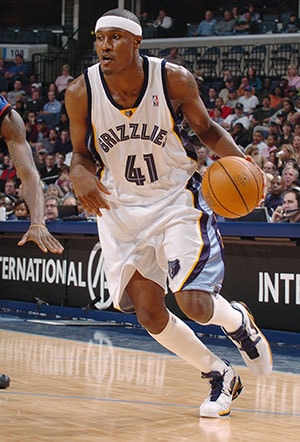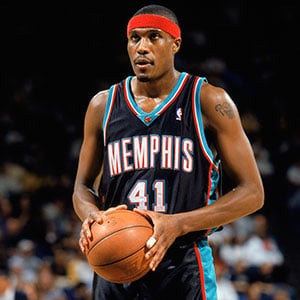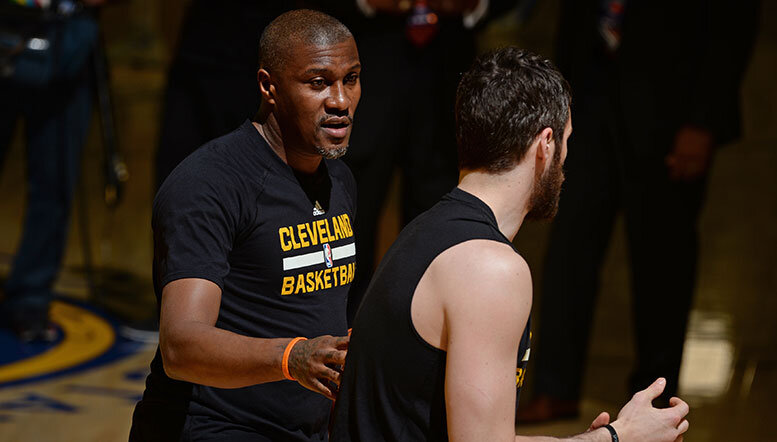By Michael Wallace
Grind City Media
MEMPHIS – Moments before a recent Cavaliers’ practice during the NBA Finals, James Posey sat with his back to a wall in the gym and thumbed through scouting reports and messages on his cell phone as players trickled onto the court.
A tough day loomed in Posey’s latest role.
Cleveland had just been hammered by Golden State in Game 1 two nights earlier, and would get shredded and smoked the following day in Game 2 after surrendering 132 points. Plenty of schemes designed to curtail the masterpiece Kevin Durant, Steph Curry and the Warriors have painted so far filled the notes at Posey’s fingertips.
As the series shifts to Cleveland this week, the Cavaliers could definitely use a few doses of the defensive tenacity and mental toughness that defined Posey’s career – way back to his two-way standout days in Memphis on those first Grizzlies’ playoff teams.
But Posey’s playing days ended six years ago. For the past two years, the Cleveland native has been channeling his quiet strength and postseason experience into his role as a player development assistant coach and scout for the defending champion Cavaliers.
“As a player, I was able to go out there and lead by example,” Posey told Grind City Media when asked what defensive impact he might have had on this series in his prime. “But now, my job is to sort of put the picture in their heads a little bit, let them know what’s coming and what to expect. I try to mentally prepare them that way so they can see it and visualize what they might need going into the situation.”

Drawing a response to that length and extent from Posey as a player was nearly impossible for the 6-8 swingman who embodied the ‘3-and-D’ and ‘Stretch-4’ labels well before the analytics movement branded those nicknames into the basketball lexicon. His scoring average of 11.6 points a game over two seasons in Memphis was the highest of a career that included stints with seven teams in 12 years.
Back then, Posey was a soft-spoken man of few words whose versatility on the court spoke volumes. Count former Grizzlies coach Hubie Brown among the many basketball icons who initially never imagined Posey’s personality would open up enough to lead him on a path to coaching in the NBA.
But to truly know Posey is to comprehend he’s never faced a role to which he’s been unable to adapt.
“You never know about guys,” Brown said. “The players you think might become coaches don’t become coaches for whatever reason. And then there are guys you just say, ‘Unexpected’ – and that’s James Posey. But I see he has fit in perfectly, and I’m happy for his success on this journey. He’s working his way through this. All you want to do, when someone opens the door for you, is to be ready to step through that door and produce. That’s what he’s always done, starting way back with us in Memphis.”
The same work ethic Posey had as the second-leading scorer on Brown’s Memphis team that won 50 games and made the franchise’s first playoff appearance in 2004 is the same relentless approach he takes into daily development workouts with Cavaliers’ forward Kevin Love. During a series in which LeBron James needs consistent help from Cleveland’s other All-Stars to match Durant and Curry, it’s Love who must emerge as a pivotal contributor if the Cavaliers are to fight their way back.
Although Love’s production has fluctuated throughout the playoffs, he’s healthy and contributing 21 points, 14 rebounds and 1.5 blocks. But Cleveland needs Love to shoot far better than his current clips of 44.4 percent overall and 38.4 from three-point range. Posey’s role is to help Love develop the defensive techniques needed to keep him on the court and effective when Golden State shifts to smaller lineups.
In Game 1, Love struggled to exploit his size advantage when he was defended by Warriors’ guard Klay Thompson. And in Game 2, Cavaliers’ coach Ty Lue backed away from establishing Love in the post when Durant played an extended stretch at center when the game was close in the third quarter.
Love believes Posey’s advice and background as a player who has taken on different roles with various championship teams has been a calming, reassuring influence the past two years in Cleveland.
“That’s helped me out since Day One,” Love said. “Posey is very self-assured, very confident. My respect is high for Posey, and he’s one of the guys I’ve sought out to pick his brain on everything for how I can get better and help this team.”
Getting Posey to open up and communicate is not as much of a challenge as in the past.
“We make him talk,” Love joked. “To get through to a guy, you have to have that back-and-forth. You need that openness. You need somebody you can put your arm around and ask what he sees. Posey knows what works, what it takes to get to the next level. And at the end of the day, you want to gain knowledge from someone who’s been in that spot before and he’s done it on multiple occasions.”
Posey’s vast resume of winning started in Memphis, where the Grizzlies made one of the biggest turnarounds in NBA history when they went from winning 28 games in 2002-03 to 50 victories the next season. Two years later, Posey and Jason Williams were dealt from Memphis to Miami, where they were key starters alongside Shaquille O’Neal and Dwyane Wade on the Heat’s 2006 title team under Pat Riley.

And two years after that, Posey was acquired by Boston to bring championship experience to a then newly-assembled Big Three of Kevin Garnett, Ray Allen and Paul Pierce. With Posey in tow on a supporting cast that also included current Grizzlies’ guard Tony Allen, the Celtics won a title in 2008. At each step, Posey gained pointers from legendary coaches on teams that accomplished historic feats. After retiring in 2011, Posey entered coaching with the Cavaliers’ D-League affiliate in Canton three years ago and jumped to the Cleveland bench in time to assist the franchise’s first title run last season.
For those keeping count, that’s two rings as a key role player and one as an assistant coach for Posey.
“I always felt I was a winner and had something to contribute,” Posey said. “I remember my first years in the league watching the playoffs and wondering what I’d do if I ever got in that situation. Then when I got to Memphis, Hubie gave a lot of us our first taste of it, and it was the best thing for me. I tasted it and was like, ‘Man, it’s a great feeling. I like this.’ And from that Memphis playoff experience, my main thing when I got to Miami and then to Boston was to make sure I was prepared, because I didn’t want to be the guy to mess everything up. So I’m taking notes, asking questions, everything.”
Posey points out what he’s drawn from each dynamic coach that he applies to his current role.
From Hubie BrownHubie had like this Chinese fire drill rotation, where he played 10, 11 guys,” Posey said. “There was always substitutions. I see why he did it. I learned what a vertical and horizontal game plan was about.
From Pat RileyThat’s a master motivator right there,” Posey said. “He’d come in with his stories and he’d have you ready to run through every single brick wall out there. You just didn’t want to let him down. It was his calmness and arrogance. He was like, ‘We’re going to get this done. You just listen up.’
From Doc RiversHe brought great energy and intensity on those Boston teams,” Posey explained. “His after-time-out plays were top notch. He wasn’t always rah-rah, but when he said something, you were locked in.
Posey is in the Finals yet again, being groomed by former head coaches who are now assistants under Lue, who was also once a role player on championship teams. Lue charted a similar path and worked his way through the ranks as an assistant before taking over in Cleveland midway through last season.
“He’s coming along very quickly,” Lue said. “Every year, he’s gotten better at opening up and being more vocal. He’s already a great person and you know how (important) he was as a player. Guys respect him. I talk to him all the time about (not) worrying about stepping on guys’ toes. If you see something, speak up and say it. He does a great job with that.”
Posey is embracing the process.
“Me and Ty always laugh about the coaches who are real vocal, because we’re not really that way,” Posey said. “We’re just more calm, reserved and take a more relaxed approach. That comes from being prepared. And if you translate that, your guys will be prepared in big moments, too, and have that quiet confidence. For me, it’s just about bringing that calmness and positive energy people can feed off.”
Brown insists Posey is acquiring all the tools to continue a successful transition into coaching.
“He’s been developing quietly,” Brown said. “He’s never been one of these guys who’s out beating the drums about, ‘I can do this, I can do that.’ Because whether it’s us when I had him in Memphis or anyone who’s been around him this entire way, everyone will tell you the same thing about Posey. He’s a worker who gets the job done no matter, no matter what he’s facing, no matter the challenge.”
